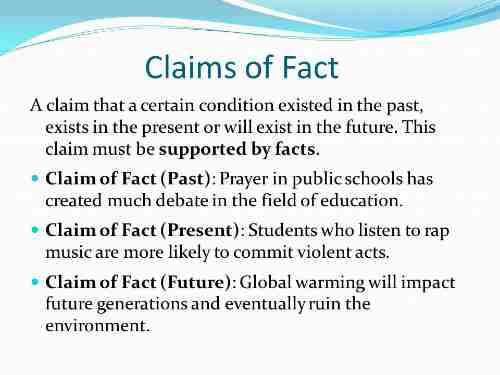A claim is an opinion that is more or less based on evidence. Claims
Because they keep academic writing alive, they are probably the most crucial educational research component.
Without them, writing is primarily descriptive and would not present new perspectives. As a result, writing a claim can be difficult.
Writing is not always easy. This is because they must be assertive, confident, and clear in their opinions. If they make unsupported or broad claims, weak arguments can fail.

Let’s examine a more detailed example of the claims process in an argument over water purification. According to the World Health Organization(WHO), one in three people doesn’t have access to a source of drinking water.
There is no clean water in the world, and it is only getting worse. Water.org was cofounded by
American actors Matt Damon and Gary White responded to this issue. This group is
These are claims of fact, policy, and value supporting its activist goals.
A Claim for Fact
A Claim of Fact claims that something quantifiable has ever existed, will exist, or does exist. The central point of dispute in factual claims is reasonableness. A Claim of facts debates whether the Claim’s statements are correct or wrong, valid or invalid, or true or false. These implications are based on what is known and not unknown. Factual claims also include cause-to–effect relationships.
Arguments for a claim are intended to convince an audience that something isn’t currently accepted as fact. In arguing against a claimed point, the goal is to get your audiences to reject a proposed new truth or defend the status quo that something is a fact. For example, a claim of existence could be an assertion about the past, present, or future.
Past claims tend to address the assigning or assuming motive for historical actions. Examples of this include: “General Custer was liable for the massacre of the Little Big Horn”; or “Democratic policies caused the rise of terrorism.”
Current events tend to be the focus of present claims of facts. Examples include “Where is God,” Divorce leads to increased juvenile crime,” “Video games contribute to teens’ violence,” or even “Climate change is exacerbated.”
Future claims are statements made regarding the nature of future events. Examples include: “Tuition will rise next year at community colleges,” “Oil price will continue to increase,” or “The Tesla Model 3will become the most-sold sedan here in the United States.”
Value Claims
A value claim, as it sounds, asserts moral and social value. These claims can be made in the context of judgment and
evaluation. However, many topics can be evaluated differently by different people. Therefore, value claims must be assessed in a variety of ways.
These value claims are usually more controversial than those based on fact. However, some value claims are not always safe.
They can turn off readers who don’t share their values. Therefore, it is essential to include them.
An argument on a controversial topic shows a writer’s awareness of her biases. In fact,
Specific statements make value claims because they try to convince readers to accept a position.
Referring to a subject for which there is no objective fact.
While claims to the truth are generally descriptive, values are normative. This means that they can often be made.
This sentence was constructed using the auxiliary clause should.
…” There is worse things
code, though philosophers spent centuries debating whether such a code exists. For example:
A writer who believes “murderers should die” can do so on the ground that murder is not an offense.
No matter the circumstances, it is morally unsound. A reader will
Either you agree to the same set, or he won’t. This is because the claim relies only on subjective moral ideas
This leaves no room to compromise
Policy Claims
Decorated image claim under policy states that certain conditions are required or something should be made to solve a problem.
Examples of policies:
The city’s education board should start an honors program for all students.
As with smoking ads, soda ads must be stopped to discourage unhealthy behavior.
It doesn’t matter what type of claim it is; you will typically combine various support to that claim to write a coherent argument.
Claim for Fact, Value, or Policy: Library Databases have credible resources to support an initiative, program, or policy claim.
Claim to Fact: The assertion that a condition exists or will be maintained. Factual evidence is required to support a claim of facts.
Claim for Value: A statement that expresses opinion or approval. Value claims concerning morality refer to judgments regarding the rightness or wrongness in a particular belief or behavior.
The claim of Policy: Policies or solutions are made to promote and change policies or solutions that are either ineffective or conducive towards perpetuating a bad situation.
Conclusion
The claim of cause and effect, claim based on fact, declaration of policy, or share of value – whatever type of claim you choose, your claims and paper will be solid if these guidelines are followed. Of course, it would help if you practiced writing persuasive essays. Additionally, it would help if you were an expert in the subject matter.
The claims of fact do not exist. It is merely a claim that a point exists, accompanied by solid arguments. It is debatable because it is implied that the speaker doesn’t have a method to prove the claim’s actual reality. Compelling reasons must support the assertion.
For more information and assistance, visit the following websites.
https://www.craftonhills.edu/current-students/tutoring-center/writing-tutoring/hamletts_and_abads_three_claims.pdf
https://courses.lumenlearning.com/suny-esc-wm-englishcomposition1/chapter/types-of-claims/
https://libguides.chaffey.edu/c.php?g=1094181&p=7980344
https://socialsci.libretexts.org/Bookshelves/Communication/Argument_and_Debate/Arguing_Using_Critical_Thinking_(Marteney)/04:_Claims/4.04:_Types_of_Claims
https://www.sccollege.edu/Faculty/MRoe/Documents/english_103_notes.htm
https://www.unit5.org/cms/lib03/IL01905100/Centricity/Domain/1254/vern persuasive patterns.pdf
http://havlicek.weebly.com/uploads/6/8/5/2/685209/ww2claims.pdf
https://blog.penningtonpublishing.com/spelling_vocabulary/the-difference-between-claims-and-facts/
https://studybay.com/blog/claim-of-fact-essay-topics/
https://usflearn.instructure.com/courses/813386/files/30551645/download?download_frd=1